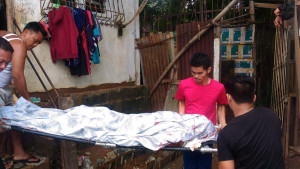PNP: Deaths of drug suspects being probed, not swept under rug

The body of drug suspect Jack Bertulfo is being taken out of his house after the Olongapo City police shot him dead when he tried to engage cops searching his house in a gunfight on Wednesday (July 13, 2016) afternoon. (Photo from the Olongapo City Police Office)
DAVAO CITY – The deaths of drug trafficking and pushing suspects in the hands of law enforcers and suspected vigilantes are all being investigated and are not being shoved under the rug, according to Chief Supt. Camilo Cascolan of the PNP directorate for operation.
Based on the figure the Philippine Daily Inquirer has collated, 136 drug suspects had been killed from June 30 (the day President Duterte assumed office) to July 11. Some of them, such as Ariel Pitong Unay, a former Army officer and an alleged top drug personality in Catarman, Northern Samar, were killed in supposed police operation.
But the police’s arguments that suspects were killed when they put up a fight or that they had to be shot dead after trying to wrestle the firearms of their arresting officers, had become all too familiar.
Such incidents raised suspicions that some drug personalities were deliberately executed even after their arrest.
Cascolan said even those considered as legitimate police operations, specifically when suspects died, have been placed under investigation.
Article continues after this advertisementHe said the police also wanted to ensure legitimate operations and not a rubout.
Article continues after this advertisement“Whatever happens in police operation, especially if there are killed, there has always to be an investigation,” he said.
Under the PNP manual, the Internal Affairs Service would investigate moto propio all these police operations, Cascolan said.
“We will run after those who committed wrong doings,” he added.
“We do not plant evidence, we do not tolerate abuses. When (suspects) are arrested (or killed) it should really be a clear police operation,” Cascolan said.
As to the other instances of killings, Cascolan said the police were also trying to determine if these were indeed drug-related and if these were the handiwork of so-called vigilantes.
“We are also investigating if these are drug-related. It’s possible that some people were killing their enemies and labeling them as drug pushers. These are all being investigated,” he said.
Cascolan said the police would also not tolerate vigilantism and would go after any group that would muddle the police’s anti-drug campaign.
Asked on the progress of Oplan Tokhang, the police’s “knock and plead” campaign, Cascolan said the volume of drug users and pushers who surrender continue to increase.
He credited the trend to pressure on chiefs of police to produce results in their areas or risk being replaced.
“Tokhang is a combination of police community relations and operation. You need to talk the suspects over for them to surrender and tell them that if they do not, we will have an operation against them and arrest them,” he said.
“We need to reduce the drug problem drastically within the first six months. Fifty percent for the first three months. We reduce the supply etc. In the 6th month, we should be able to 100 percent defeat drugs or at least, we have significantly reduced the problem,” Cascolan said.
Asked about observations that only the poor were being targeted under Oplan Tokhang, Cascolan disagreed with the perception.
He said during their recent meeting in Camp Crame, the cases of suspected pushers in posh subdivisions were also discussed.
“We also took that up. For example, an individual lives in a posh subdivision, has five Pajeros, he has a water craft or airplane but has no clear day job… He lives beyond his means. Actually, we already have PNP teams that would take on subdivisions,” he said.
Cascolan said the police have started “preparing the legal procedure such as securing the necessary documents because subdivisions are considered private properties.”
“We cannot just enter exclusive subdivisions. We have to get permission from the developer. Unlike in slum areas where there is open public access, there are procedures to follow when dealing with private properties, unless the crime is in progress and our policemen is in the vicinity,” he said. SFM